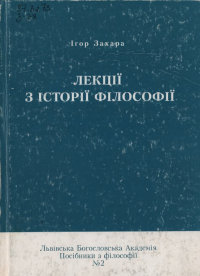Lectures on the History of Philosophy: Lviv, Lviv Theological Academy Publishing House, 1997, 398 p.
Keywords:
textbook, worldviewSynopsis
Ihor Zakhara's textbook on philosophy. The book covers history, philosophy from antiquity to the twentieth century.
The book was published with the financial support of the International Fund «Renaissance».
CONTENTS
Preface
Introduction
1. Historicity of philosophical knowledge
2. Mythology, philosophy, religion as types of worldview
3. Problems of scientificity of the philosophical worldview
Philosophical culture of the peoples of the Far and Middle East
1. Ancient China
2. Ancient India
3. Babylon, Egypt and Iran
Ancient philosophy
Philosophy of the pre-Socratics
1. Features of the development of philosophy in ancient Greece
2. The origin of philosophical thought: Homer, Hesiod, Orpheus
3. Miletus philosophical school: Thales, Anaximander, Anaximenes. Heraclitus.
4. Italian philosophical school: Pythagoras and the Pythagoreans. Xenophon, Zeno of Eleusis and Parmenides.
5. From the doctrine of nature to atomism: Empedocles, Anaxagoras, Democritus
6. The Sophists. Socrates Socratic schools
Classical Greek philosophy
Philosophical views of Plato
1. Life and work of Plato
2. Plato's idealism
3. Philosophy of nature
4. Ethics, aesthetics, politics
Philosophical views of Aristotle
1. Life and work of Aristotle
2. The doctrine of being
3. The doctrine of living nature, epistemology
4. Politics, ethics, aesthetics
Hellenistic philosophy
1. Stoicism, epicureanism, skepticism
2. Alexandrian philosophy
3. Philonism
4. Neoplatonism
Medieval philosophy
Apologetics and patristics
1. Medieval philosophical paradigm
2. Helleno-Byzantine and Roman-Western European branches of apologetics
3. Eastern patristics. John of Damascus
4. Western patristics. Aurelius Augustine
The Emergence of Scholastic Philosophy in Western Europe
1. Late antique education and philosophy. Boethius
2. The dispute about universals as a key problem of scholastic philosophy (nominalism and realism)
3. Arab and Jewish medieval philosophy. Latin averroism.
Philosophical and theological Aristotelianism
1. The heyday of scholasticism
2. Philosophy and work of Thomas Aquinas:
(a) life and work
(b) theology and philosophy
(c) natural theology
(d) metaphysics
(e) picture of the world
(f) problems of cognition
(g) ethical and social doctrine
3. Roger Bacon and the Oxford School
4. Late scholasticism. Duns Scotus. William of Ockham
5. Medieval mysticism
Philosophy of the Renaissance
1. The transitional nature of Renaissance philosophy
2. Italian humanism
3. Philosophical views of Nicholas of Cusa and Giordano Bruno
4. Social theories of the Renaissance
5. Michel Montaigne and philosophical ideas of the New Age
Philosophy of the Modern Age
1. Features of the philosophical paradigm
2. Francis Bacon and Thomas Hobbes as philosophers
3. The doctrine of substance in R. Descartes, B. Spinoza and G. W. Leibniz
4. The sensualist philosophy of John Locke, George Berkeley and D. Hume
5. French philosophy of the XVII – XVIII c.
German philosophy of the late XVIII – early XIX centuries.
1. Sources of German classical philosophy
2. Philosophical views of Immanuel Kant
3. Objective idealism and dialectic of Hegel
4. The end of German classical philosophy
Modern world philosophy (XIX – XX centuries)
1. Philosophy of life
2. Existential tendency in modern world philosophy
3. Positivism and its varieties
4. Modern religious and philosophical doctrines
Downloads




